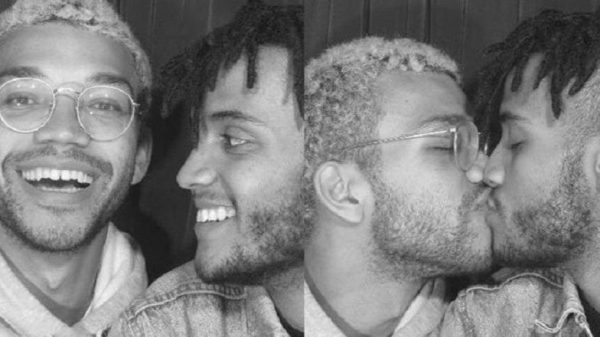While homosexuality is progressing into mainstream culture, for the hip-hop community there is still a long with-standing barrier for Black LGBT youth.
This week marks the 10th anniversary of the ground-breaking LOGO sitcom, Noah’s Arc. Created by Patrik-Ian Polk, the sitcom was a first in bringing Black gay love to prominence with a diverse amount of characters and relationships. Since the cancellation of the show in 2006, there have been platforms for Black gay men to be present, but the hip-hop community has continued ostracizing LGBT rappers, seeing them as a threat to the “hardcore” appeal that emanates throughout the genre.
VH1’s Love and Hip Hop: Hollywood seeks to break through that barrier by showcasing the lives of two young up-and-coming Black gay rappers in love, Miles and Milan. Milan is out and  Miles is in the closet. Adding to this is Miles’s relationship with his old flame, Amber and his ties to the church. Following Miles’s highly-anticipated coming out episode, a panel including rappers, church leaders, media elites and activists were on board to discuss being “Out In Hip Hop,” hosted by ABC News journalist T.J. Holmes.
Miles is in the closet. Adding to this is Miles’s relationship with his old flame, Amber and his ties to the church. Following Miles’s highly-anticipated coming out episode, a panel including rappers, church leaders, media elites and activists were on board to discuss being “Out In Hip Hop,” hosted by ABC News journalist T.J. Holmes.
Noted from the very beginning, Milan was clear to indicate the importance that his relationship with Miles is not based in the confines of a bedroom. These are two Black gay men in a committed relationship. In this day in age, where Black gay love is rarely visible, especially in Hollywood, where notable Black gay men such as Michael Sam and Jason Collins have become notoriously known for dating white men, the declaration of Black gay love existing speaks volume in a world where our own identities are undervalued. Not only do we have the ability to love ourselves but we have the ability to love each other.
The hip-hop community featured Love & Hip Hop cast members Ray J & Lil Fizz, documenting their experiences as being part of a genre that isn’t open to their gay counterparts. Rap veteran DMC, of Run DMC, addressed the issue of how abhorrent misogyny is within rap music and due to the lack of concern for women and their value, gay men are shunned. In the rap world, we are seen as perpetrators of the masculine image and anything that conflicts against the hyper-masculinity of the rap game is a threat against the patriarchy that rappers have aligned themselves with since the rise of gangsta rap in the mid-80’s. A gay rapper would have to be Kendrick, Drake and J. Cole combined to be noticed within the community and also require a co-sign and while there are rappers such as Jay-Z and Kanye West who support homosexuality, no one wants to be “gay by association.”
In the discussion, there are examples of artists like Frank Ocean and Big Freedia but by and large, both artists have only been successful in their respective niches. Freedia is a bounce musician in New Orleans, a sect that is largely influenced and features a variety of LGBT performers. Ocean is a R&B singer and while his letter was ground-breaking, he has since remained in the grey about his sexuality as it relates to him in the industry.
 Rapper Cakes Da Killa provided insight on the realities of Black gay youth and how we as a community are dealing with more life-threatening issues that disable from celebrating gay marriage entirely and EBONY Magazine columnist, Michael Arceneaux shared his struggles as a youth equating his sexuality to death, establishing the importance of seeing a variety of Black gay men succeed from darker times.
Rapper Cakes Da Killa provided insight on the realities of Black gay youth and how we as a community are dealing with more life-threatening issues that disable from celebrating gay marriage entirely and EBONY Magazine columnist, Michael Arceneaux shared his struggles as a youth equating his sexuality to death, establishing the importance of seeing a variety of Black gay men succeed from darker times.
The perspectives of the church also were added in to discuss how their dismissal of LGBT people helps to promote the homophobia present in hip-hop. While religious voices were positive, Jamal Bryant was brought in to push his agenda of gays being in line with gamblers and drug addicts under the guise of love. Real World star-turned-activist Karamo Brown retorted showing passion and conviction about the abuse Bryant was given the platform to promote.
However, Brown’s thoughts, while definitely well-intentioned were problematic. His call for LGBT churchgoers to fight against their church leaders is easier said than done due to the incessant violence that is brought upon when we attempt to. It is not our job as a community to fix the wounds the church has inflicted upon us.
While “Out In Hip Hop” only grazed the surface of the issues, the true message of the special is clear in the statement that nothing prepares a Black gay youth for homophobia. There is no salary or paid time off. We are forced to deal with us as individuals and the world’s perception of us in and outside of the closet. This special served as not only a reminder of where we are but a step forward.

